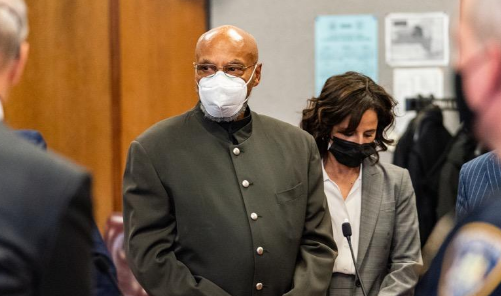Photos: Jeenah\Innocence Project\Wikimedia Commons
In 1966, Muhammad A. Aziz (above, in white mask yesterday, in Manhattan court) and Khalil Islam were wrongly convicted of assassinating Malcolm X.
After spending a combined 42 years in prison — including several in solitary confinement — Innocence Project and Shanies Law Office are relieved to announce today that they have both been exonerated.
Upon hearing of his exoneration, Muhammad said, “The events that led to my wrongful conviction and imprisonment should never have occurred; those events were and are the result of a process that was corrupt to its core — one that is all too familiar — even in 2021.”
Both men were robbed of the prime years of their lives for the murder of a civil rights icon. Muhammad is now 83, and Khalil passed away in 2009 without ever getting the chance to see his name cleared.
When Malcolm X was shot and killed while speaking at the Audubon Ballroom, both Muhammad and Khalil were home with their families and no physical evidence implicated either one of them — yet they were still convicted.
Muhammad and Khalil’s exoneration comes after a recent reinvestigation revealed compelling new evidence of their innocence, including documents known to the FBI and NYPD that were hidden from the defense at trial. These documents not only contained information that pointed to people other than Muhammad and Khalil, they also revealed that undercover NYPD officers were in the ballroom when the shooting occurred and that prosecutors did not disclose this information to the defense.
“Today we think of Malcolm X as this icon of history, and you might assume that because of his importance and influence that it would have motivated authorities to go above and beyond to get to us the truth and to figure out who killed him at the time. But in fact, it’s both because of and in spite of who Malcolm X was that seeking justice for his murder — the murder of a Black activist who spoke out against police brutality and systemic oppression — was not a priority in the ‘60s,” said Vanessa Potkin, Innocence Project director of special litigation, who represented Mr. Aziz and Mr. Islam’s estate.






